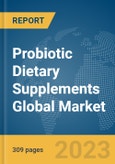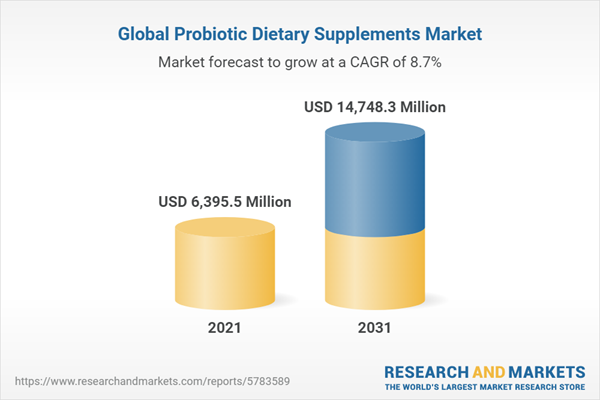The probiotic dietary supplements market reached a value of nearly $6,395.5 million in 2022, having grown at a compound annual growth rate (CAGR) of 7.7% since 2017. The market is expected to grow from $6,395.5 million in 2022 to $9,437.9 million in 2027 at a rate of 8.1%. The market is then expected to grow at a CAGR of 9.3% from 2027 and reach $14,748.3 million in 2032.
Growth in the historic period resulted from strong economic growth in emerging markets, increase in digestive diseases, growing number of health-conscious consumers and the COVID-19 impact.
Going forward, increasing number of diseases, rising older population, rising penetration of organized retail, increased dietary consciousness and increasing demand for sports nutrition will drive the growth. Factors that could hinder the growth of the probiotic dietary supplements market in the future include potential side effects and the Russia-Ukraine war.
The probiotic dietary supplements market is segmented by source into yeast and bacteria. The bacteria market was the largest segment of the probiotic dietary supplements market segmented by source accounting for 79.8% of the total in 2022. Going forward, the yeast market is expected to be the fastest growing segment in the probiotic dietary supplements market segmented by source, at a CAGR of 8.5% during 2022-2027.
The probiotic dietary supplements market is segmented by form into capsules, chewables and gummies, powders, tablets and softgels and other forms. The capsules market was the largest segment of the probiotic dietary supplements market segmented by form accounting for 34.0% of the total in 2022. Going forward, the powders market is expected to be the fastest growing segment in the probiotic dietary supplements market segmented by form, at a CAGR of 8.4% during 2022-2027.
The probiotic dietary supplements market is segmented by distribution channel into business to business and business to consumer. The business to business market was the largest segment of the probiotic dietary supplements market segmented by distribution channel accounting for 80.0% of the total in 2022. Going forward, the business to consumer market is expected to be the fastest growing segment in the probiotic dietary supplements market segmented by distribution channel, at a CAGR of 8.4% during 2022-2027.
The probiotic dietary supplements market is segmented by application into food supplement, specialty supplement and infant formula. The food supplement market was the largest segment of the probiotic dietary supplements market segmented by application accounting for 52.1% of the total in 2022. Going forward, the infant formula market is expected to be the fastest growing segment in the probiotic dietary supplements market segmented by application, at a CAGR of 8.4% during 2022-2027.
The probiotic dietary supplements market is segmented by end use into infants, children, adults and geriatric. The adults market was the largest segment of the probiotic dietary supplements market segmented by end use accounting for 52.4% of the total in 2022. Going forward, the children market is expected to be the fastest growing segment in the probiotic dietary supplements market segmented by end use, at a CAGR of 8.3% during 2022-2027.
North America was the largest region in the probiotic dietary supplements market, accounting for 37.2% of the total in 2022. It was followed by Asia Pacific, and then the other regions. Going forward, the fastest-growing regions in the probiotic dietary supplements market will be Asia Pacific, and, South America where growth will be at CAGRs of 8.9% and 8.5% respectively. These will be followed by Eastern Europe, and, Middle East where the markets are expected to grow at CAGRs of 8.37% and 8.36% respectively.
The probiotic dietary supplements market is fairly concentrated, with a few large players. The top ten competitors in the market made up to 31.65% of the total market in 2021. Reckitt Benckiser LLC was the largest competitor with 8.35% share of the market, followed by Procter & Gamble with 7.29%, International Flavors & Fragrances (IFF) with 5.88%, Church & Dwight Co Inc with 4.08%, Koninklijke DSM NV with 3.07%, Chr. Hansen Holding A/S with 1.81%, BioGaia AB with 0.76%, PharmaCare Laboratories with 0.27%, Probi AB with 0.08%, and Protexin with 0.05%.
The top opportunities in the probiotic dietary supplements market segmented by source will arise in the bacteria segment, which will gain $2,397.2 million of global annual sales by 2027. The top opportunities in segment by form will arise in the capsules segment, which will gain $1,059.4 million of global annual sales by 2027. The top opportunities in segment by distribution channel will arise in the business to business segment, which will gain $2,402.8 million of global annual sales by 2027. The top opportunities in segment by application will arise in the food supplement segment, which will gain $1,624.2 million of global annual sales by 2027. The top opportunities in segment by end use will arise in the adults segment, which will gain $1,627.4 million of global annual sales by 2027. The probiotic dietary supplements market size will gain the most in the USA at $914.8 million.
Market-trend-based strategies for the probiotic dietary supplements market include focusing on dairy-free probiotics, developing probiotic ingredients for sports nutrition, focusing on long-life probiotics, focusing on customized probiotic supplements, focusing on product innovations and leveraging partnerships and collaborations.
Player-adopted strategies in the probiotic dietary supplements market include delivering health benefits through the launch of new products, accelerating innovation in metabolic health, expanding capabilities through strategic acquisitions, expanding manufacturing facilities across key locations and focusing on strategic collaborations and partnerships.
To take advantage of the opportunities, the publisher recommends the probiotic dietary supplements companies to focus on dairy-free probiotic products, focus on probiotic ingredients for sports nutrition, focus on product innovations, focus on technological advancements, focus on customized probiotic supplements, expand in emerging markets, continue to focus on developed markets, provide competitively priced offerings, participate in trade shows and events, focus on online promotions, continue to target fast-growing end-users, and focus on fast-growing applications.
Table of Contents
Executive Summary
Probiotic Dietary Supplements Global Market Opportunities and Strategies to 2032 provides the strategists; marketers and senior management with the critical information they need to assess the global probiotic dietary supplements market as it emerges from the COVID 19 shut down.Reasons to Purchase
- Gain a truly global perspective with the most comprehensive report available on this market covering 12 geographies.
- Understand how the market is being affected by the coronavirus and how it is likely to emerge and grow as the impact of the virus abates.
- Create regional and country strategies on the basis of local data and analysis.
- Identify growth segments for investment.
- Outperform competitors using forecast data and the drivers and trends shaping the market.
- Understand customers based on the latest market research findings.
- Benchmark performance against key competitors.
- Utilize the relationships between key data sets for superior strategizing.
- Suitable for supporting your internal and external presentations with reliable high-quality data and analysis.
Description:
Where is the largest and fastest growing market for probiotic dietary supplements? How does the market relate to the overall economy; demography and other similar markets? What forces will shape the market going forward? The probiotic dietary supplements market global report answers all these questions and many more.The report covers market characteristics; size and growth; segmentation; regional and country breakdowns; competitive landscape; market shares; trends and strategies for this market. It traces the market’s historic and forecast market growth by geography. It places the market within the context of the wider probiotic dietary supplements market; and compares it with other markets.
The report covers the following chapters
- Introduction and Market Characteristics
- Key Trends
- Global Market Size and Growth
- Regional Analysis
- Market Segmentation
- Regional Market Size and Growth
- Competitive Landscape
- Key Mergers and Acquisitions
- Market Opportunities and Strategies
- Conclusions and Recommendations
- Appendix
Scope
Markets Covered:
1) By Source: Yeast; Bacteria2) By Form: Capsules; Chewables and Gummies; Powders; Tablets and Softgels; Other Forms
3) By Distribution Channel: Business to Business; Business to Consumer
4) By Application: Food Supplement; Specialty Supplement; Infant Formula
5) By End Use: Infants; Children; Adults; Geriatric
Companies Mentioned: Reckitt Benckiser LLC; Procter & Gamble; International Flavors & Fragrances (IFF); Church & Dwight Co Inc; Koninklijke DSM NV
Countries: Australia, China, India, Indonesia, Japan, South Korea, USA, Brazil, France, Germany, UK, Russia
Regions: Asia-Pacific; Western Europe; Eastern Europe; North America; South America; Middle East; Africa
Time series: Five years historic and ten years forecast.
Data: Ratios of market size and growth to related markets; GDP proportions; expenditure per capita; probiotic dietary supplements indicators comparison.
Data segmentations: country and regional historic and forecast data; market share of competitors; market segments.
Sourcing and Referencing: Data and analysis throughout the report is sourced using end notes.
Companies Mentioned
- Reckitt Benckiser LLC
- Procter & Gamble
- International Flavors & Fragrances (IFF)
- Church & Dwight Co Inc
- Koninklijke DSM NV
Table Information
| Report Attribute | Details |
|---|---|
| No. of Pages | 309 |
| Published | April 2023 |
| Forecast Period | 2021 - 2031 |
| Estimated Market Value ( USD | $ 6395.5 Million |
| Forecasted Market Value ( USD | $ 14748.3 Million |
| Compound Annual Growth Rate | 8.7% |
| Regions Covered | Global |
| No. of Companies Mentioned | 5 |









